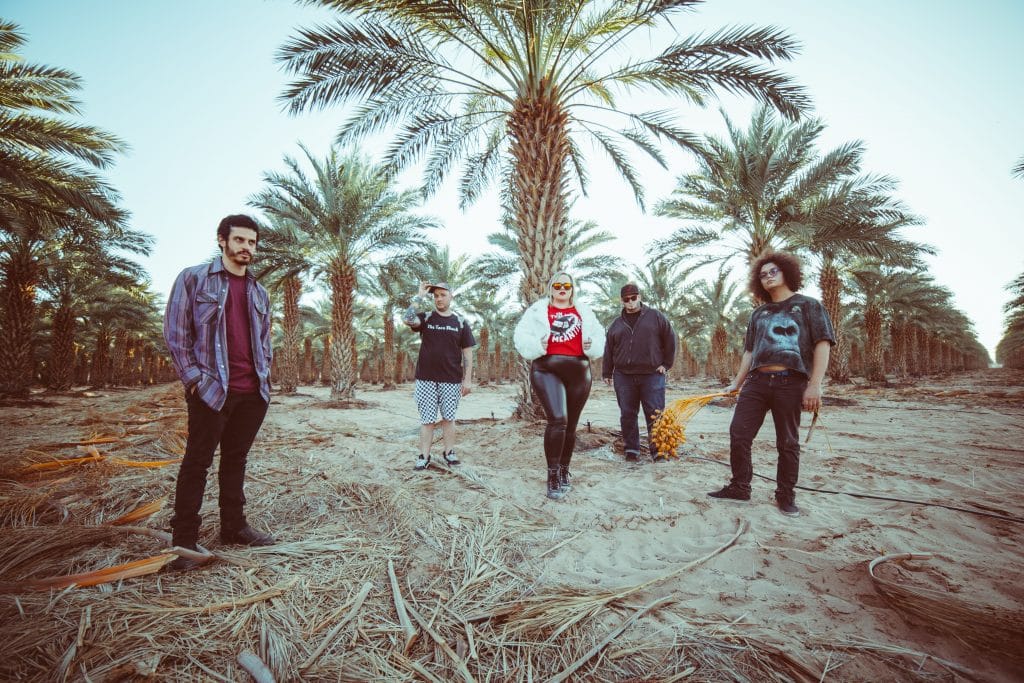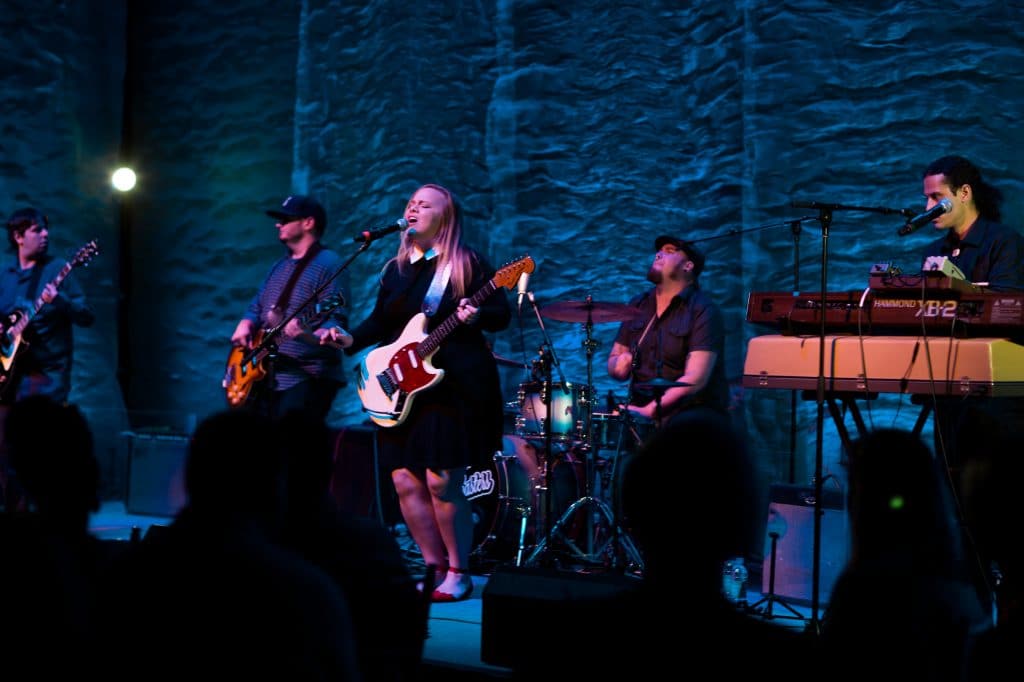The state of Florida is an estuary of sorts, of both climate and culture: a place where the freshwater-deep-South diffuses seamlessly into the saltwater-sub-tropics.
And so it’s only natural that this estuary of mangroves and mudflats would be the birthplace of The Freecoasters, a band who seamlessly diffuse the rhythm-and-blues musical traditions of the swampy American South in to the steamy, sun-drenched, tropical rhythms of Jamaican rocksteady and reggae.
With the articles I write as a reggae journalist, I try to creatively describe the sound and vibe of the artists that I cover. However, rather than trying to improve upon perfection, it just made sense to use the beautifully written metaphor above, copied from The Freecoasters’ press kit which so aptly characterizes them.
So, if you’re going after a sound like the above passage references, who better to guide you than a member of The Aggrolites? For just about twenty years, the Los Angeles band has created a treasure-trove of feel-good “dirty” reggae as they call it, skinhead reggae with a Motown flavor.
Enter Aggrolites lead singer Jesse Wagner, who did such a fine job producing The Freecoasters’ 2016 debut album, Show Up, that they recruited him to help them hone their follow up, A Different Kind of Heat, releasing tomorrow, March 12th.
“We’re all big fans and we’d heard he was a great guy and didn’t shy away from fan interactions, so one of us just hit him up and kind of naively asked him to listen to our music,” said bass player John Schiller, recounting how they linked up with Wagner back in 2015. “He was totally cool, and chatted with us and was interested in us as a band. We kind of went out on a limb and asked him if he’d ever have any interest in producing a record, and he was totally down.”
The Freecoasters already had studio time scheduled in their home base of Fort Myers, so they bought him a plane ticket. Wagner stayed with them for 10 days as he put them through what they called “Reggae School” as they hammered out their debut album.
Fast forward to the end of 2018, when the Florida band had enough material together to make a new record. They had turned over some bandmates by then, but the new members knew and respected the Aggrolites just as much, so they collectively agreed to solicit the tutelage of Wagner once again. This time, it only took seven days for the band to pound out their second record, which they recorded at a studio in Cape Coral called Juniper Recording. Upon completion, they hired Aggrolites keyboardist and studio whiz in his own right, Roger Rivas, to mix and master. (And as a digital-only bonus, they had Jayson “Crazy Baldhead” Nugent of The Slackers create dub versions of three of the tunes.)
“We think the new record is a huge leap for us in terms of sophistication, and it really hones in our original vision, to blend American soul music with Jamaican reggae and rocksteady,” Schiller said. “We tried to touch on different aspects and eras of both genres, and tried to channel some of our favorite artists in each. We think we ended up with something pretty unique here, and we’re really proud of it.”
When pressed for more insight into that statement, Schiller happily obliged.
From the reggae side of things, he credits Toots and the Maytals as a huge inspiration, lamenting Toots Hibbert’s recent death due to COVID. Specific to their new release, however, he noted the early lover’s rock music from John Holt, stating that they really liked some of the “maybe over-the-top pop-instrumentation” on his early 70’s records.
They also “drew a lot” from rocksteady-era Delroy Wilson and Derrick Harriott, who he mentioned is under-appreciated in his opinion. “He was doing a lot to kind of blend American soul influences into reggae and rocksteady music starting in the late 60’s. Derrick Harriott and the Crystalites really play a lot into our songs ‘Look What You’ve Done’ and ‘Magnolia.’”
Ultimately, though, Schiller said that the influence who pops up the most frequently is Bill Withers, another legendary musician sadly lost to COVID. “There are little pastiches and references to different work from Bill Withers all over the album, maybe most directly on the tunes ‘Power’ and ‘Watch it Burn.’”
For ‘Power,” Schiller said they aimed to replicate the “tough groove and feel” of a song like “Use Me,” before they “punched it up with some Fela Kuti style funk,” the inspiration for “the aggressive horn parts.”
For the tune, “Watch it Burn,” Schiller said they were “trying to mine the space” between Withers’ “Who is He and What is He to You?” and “Exodus” by Bob Marley. “Just trying to dial in that one chord romp kind of feel,” said Schiller. “Just grooving on a chord and letting the lyric and melody carry the action.”
Schiller references The Temptations’ “Papa Was a Rolling Stone” as another tune in “that sort of milieu.”
“Just heavy, groovy, and still sparse,” he said. “We consciously wanted to write a song that relied on one chord. Really, I guess, mostly one chord, and a kind of asymmetrical bass line — a bass groove that kind of sounded lopsided, created some space inside that groove, and generates anxiety. All three of those tunes I mentioned, and hopefully our tune too, have an anxiety to them that kind of draws the listener closer, makes you lean in a little.”
Schiller also acknowledged other influences such as album-era Motown and Marvin Gaye’s three-album run from 1971-1973 of What’s Going On, Trouble Man, and Let’s Get it On, all of which were released on Tamla, the Motown Records subsidiary, along with the full-album efforts of Stevie Wonder around the same time: Talking Book, Innervisions, and Songs in the Key of Life.
“These had a huge influence on the sonics of the record,” Schiller explained, specifically pointing to tunes like “’Look What You’ve Done” and “Shook.”
For context, Schiller expanded upon the nuances of this era of Motown music: “So, originally, the Tamla label was for heavier R&B sounding artists, music that founder Barry Gordy expected to only be popular with Black audiences. And then on Motown (Records), they’d release the poppier records that they expected to have cross-over success. But when Marvin Gaye and Stevie Wonder started pushing to make more mature music, and eventually to create albums instead of singles — doing what rock artists had been doing for years by that point — writing and recording songs that were intended as album-only cuts that were never even intended to be singles, Gordy put a lot of that music on the Tamla imprint. Again, kind of because he expected only Black audiences to be interested. But this new way of using Tamla kind of freed Marvin and Stevie of the pressure to make number one singles, and let them really branch out and make artistic music in the vein of soul music, which White artists had been free to do in the rock and roll genre for years.”
“I guess that’s what we mean by sophisticated,” he ruminated. “You listen to those albums and compare them to the singles from those same artists just three and four years prior, and those albums are just leaps forward in sophistication.”
Then, giving it some more thought, he added, “I’ve heard someone say Marvin started making ‘grown music.’ We wanted to write some ‘grown music.’”
Schiller continued to list other big soul influences like the early 70’s Memphis pop-soul coming from Hi Records. “Everyone knows their house band (called Hi Rhythm Section) from playing on all those great Al Green records, with those super tough downbeat grooves,” he mentioned. “But that band was so versatile.”
This brings us to the song Rootfire is premiering today, “Get By,” with which The Freecoasters model a pop-soul tune from the Hi Rhythm Section called “Trying to Live My Life Without You,” sung by Otis Clay.
Of all the songs on this splendid album, “Get By,” is most reminiscent of The Aggrolites, probably due to the prominence of the keyboards.
Rhythm guitarist and resplendent lead singer, Claire Liparulo, provided some insight into the origin of the tune, an ode to the grind that most up-and-coming bands have to endure as they juggle their dedication to their craft along with life’s responsibilities, i.e. making money to feed yourself and pay rent. “We started writing the song a while back. At that time, we were attempting to have our first statewide presence promoting our first album and most of us were working full time simultaneously. I remember a specific weekend I couldn’t take a day off at work—I was managing a boutique. The guys picked me up at my work after my shift, drove us to a show in Melbourne, FL over four hours away, drove me back to work in time for me to start my next shift, picked me up again after that shift and drove us to our show two hours away in Tampa. There were many times I remember feeling so worn out, but somehow there was this momentum that kept me going. After college, never did I ever feel like I’d made a significant financial dent in my life at that point, but I was finally feeling pulled by something I was exceptionally passionate about at the very least. And it felt so simultaneously frustrating and satisfying to finally do a thing I loved, but it couldn’t pay the bills because we were still paying our dues…We still are.”
“So, in the practice room one day, we were messing with a chord progression and I started playing with a vocal melody. And the simple question, ‘Should it be so hard to get by?’ just sort of fell out of my mouth. It so emphatically stated what I felt, and I know my band mates related. I know a lot of people do. And at the time, I was also hustling as a solo performer on top of all of this. So, I was, quite literally, singing for my supper. But paying my bills always felt like it kept me from the thing that fed my soul. I just thought, is it so much to ask to make a living doing something I love? Regardless, I know I’m a survivor, and I’ll always find a way to get by, but I’d like to do more than just that with my life, you know?”
Liparulo added that this theme serves as an underlying thread throughout many songs on A Different Kind of Heat, an album of grit and gleam. While the Freecoasters are tight and talented musically, what truly makes them soar are the supreme vocals of Liparulo. She sings with so much fire that she can belt out the ingredients of a recipe and turn it into a culinary delicacy. The viscerality of her vocals conveys potent emotion, but her polished delivery turns anguish into glory.
A Different Kind of Heat can be purchased here and pre-saved on Spotify here. All photos by: Jose Ruiz @multiplearmspro.

Did you enjoy this story? Consider donating to Rootfire to help bring more stories like it! DONATE HERE.



